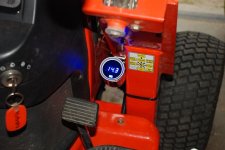Dyer retired
Gold Member
With a lot of help from Shaun (Blackmagicwoman) I bought and installed a 40 amp alternator on my BX 1800, fired up the rig and tested the voltage readings across the battery terminals with my multimeter. I got a reading of 12.6 volts with the tractor off and 14.46 volts with the engine running just above idle and 14.32 volts at idle. I also got a reading of 14.32 volts with the engine just above idle with the lights on. Very exciting, nothing caught fire, no explosions, I finally installed something without a semi-major injury, so I was happy!
I bought a digital voltmeter gauge and tested it across the battery terminals and got the same readings as I had with the multimeter at the various rpm's and with the lights on and off. I then mounted it to the tractor and hooked it up to a keyed power source, so it would only display when the engine was running. For a keyed power source, I used the wire for a rear light that came installed on the tractor, but hadn't been used. I pulled the wire back through to the battery compartment and used only the length I needed for the positive lead and I just hooked the negative terminal to the battery negative auxiliary post. I then turned the key on and got a reading of 12.0 volts with the engine off and 14.1 volts with the engine running above idle. At one point, and at a little higher rpm's, it displayed 14.2 volts. When I turn the headlights on, the reading dropped to 13.2 volts on the newly mounted meter. I ran my multimeter across the battery terminals again while this reading was displayed and got a reading of 14.32 volts on the multimeter.
I know from other threads that I should be reading about 14.5 volts and feel confident that I'm getting that from the testing directly across the battery terminals with the new gauge and with the multimeter. Can someone help me, or explain to me how to correct this, or am I missing something? It seems that the new gauge should be reading accurately and did so before I ran it through the key?
Plan B would be to run the leads to the battery directly, but through a switch that I can kill the power to it when the engine is off. Any help is appreciated.
Dyer, retired
I bought a digital voltmeter gauge and tested it across the battery terminals and got the same readings as I had with the multimeter at the various rpm's and with the lights on and off. I then mounted it to the tractor and hooked it up to a keyed power source, so it would only display when the engine was running. For a keyed power source, I used the wire for a rear light that came installed on the tractor, but hadn't been used. I pulled the wire back through to the battery compartment and used only the length I needed for the positive lead and I just hooked the negative terminal to the battery negative auxiliary post. I then turned the key on and got a reading of 12.0 volts with the engine off and 14.1 volts with the engine running above idle. At one point, and at a little higher rpm's, it displayed 14.2 volts. When I turn the headlights on, the reading dropped to 13.2 volts on the newly mounted meter. I ran my multimeter across the battery terminals again while this reading was displayed and got a reading of 14.32 volts on the multimeter.
I know from other threads that I should be reading about 14.5 volts and feel confident that I'm getting that from the testing directly across the battery terminals with the new gauge and with the multimeter. Can someone help me, or explain to me how to correct this, or am I missing something? It seems that the new gauge should be reading accurately and did so before I ran it through the key?
Plan B would be to run the leads to the battery directly, but through a switch that I can kill the power to it when the engine is off. Any help is appreciated.
Dyer, retired
